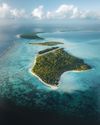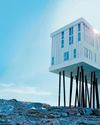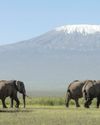
Soon after the turn of the 20th century, rumors began making their way west that man-eating lizards, 10 feet long and weighing up to 350 pounds, with fearsome talons, chain mail scales, and serrated teeth dripping with venom, had been found living on a remote Indonesian island. The source of the reports was Lieutenant Jacques Karel Henri van Steyn van Hensbroek, a Dutch colonial officer, who revealed the existence of Varanus komodoensis, the world's largest extant reptile, in 1910. But it was a 1926 American Museum of Natural History expedition to capture live specimens, led by a flamboyant Vanderbilt scion named William Douglas Burden, that caused interest in the creature to explode in popular culture. Burden's gripping account, Dragon Lizards of Komodo, inspired his friend Merian C. Cooper to dream up the primordial Skull Island for his classic 1933 film, King Kong. Civilization was steaming forward, and yet, in that era, the map still seemed to hold places that hid ancient secrets.
I arrived in Labuan Bajo, on the western coast of the Indonesian island of Flores, to find out if, nearly a century later, there was still anything left to discover. The town is the gateway to the 670-square-mile Komodo National Park, a UNESCO World Heritage Site that encompasses the forbidding volcanic islands of Komodo, Padar, and Rinca as well as numerous smaller ones. They're home not only to Komodo dragons but also to whales, turtles, dugongs, manta rays, and more than a thousand fish species. I had come to meet Adrien Portier, a young French entrepreneur, who, with his business partner Dimitri Tran, commissioned Vela, a luxurious 164-foot sailboat that is designed to cruise Indonesia's wildest and most beautiful islands.
Diese Geschichte stammt aus der July - August 2023-Ausgabe von Condé Nast Traveler US.
Starten Sie Ihre 7-tägige kostenlose Testversion von Magzter GOLD, um auf Tausende kuratierte Premium-Storys sowie über 8.000 Zeitschriften und Zeitungen zuzugreifen.
Bereits Abonnent ? Anmelden
Diese Geschichte stammt aus der July - August 2023-Ausgabe von Condé Nast Traveler US.
Starten Sie Ihre 7-tägige kostenlose Testversion von Magzter GOLD, um auf Tausende kuratierte Premium-Storys sowie über 8.000 Zeitschriften und Zeitungen zuzugreifen.
Bereits Abonnent? Anmelden

The Brando
THE STORY GOES that actor Marlon Brando first arrived on the 18-isle atoll of Tetiaroa by water-as in, he swam ashore.

Jumeirah Burj AI Arab
IF EVER THERE WAS a hotel that could achieve landmark status, it is Dubai's Jumeirah Burj AI Arab, which stands alone on its own purpose-built island just off Jumeirah Beach.

Blackberry Farm
BLACKBERRY FARM LOOMS in the consciousness of many travelers as an almost mythical Southern sanctuary in the foothills of the Great Smoky Mountains, a place whose storybook perfection has to be experienced to be believed.

Fogo Island Inn
THIS 29-ROOM MODERN CLASSIC in Newfoundland is a model for place-specific hospitality, dreamed up by founder Zita Cobb and built by Shorefast, a nonprofit that supports economic and cultural resilience on the hotel's namesake island and runs artist residencies in four isolated, incredibly photogenic studios.

ALAN CUMMING on CROSSING THE ATLANTIC
I went on Cunard's Queen Mary 2 for the first time in 2011.

high life
Italy's unfussy Dolomites are a place of cheerful communities, where simple chalets and good food can almost outshine the skiing

the possibility of an island
Cuba may be facing tough times, but the country's hoteliers, creators, and artists are forging a hopeful and beautiful way forward

in full bloom
Over the past three years, hotelier Fabrizio Ruspoli has turned an old olive farm south of Marrakech into the High Atlas's most intoxicating garden retreat

ALLIN
Fun has never been hard to come by in Las Vegas, but the arrival of pro sports, the Sphere, and lavish new hotels has upped the ante.

Forward March
Across Kenya, community initiatives are protecting the country's wildlife and environment. By Mary Holland